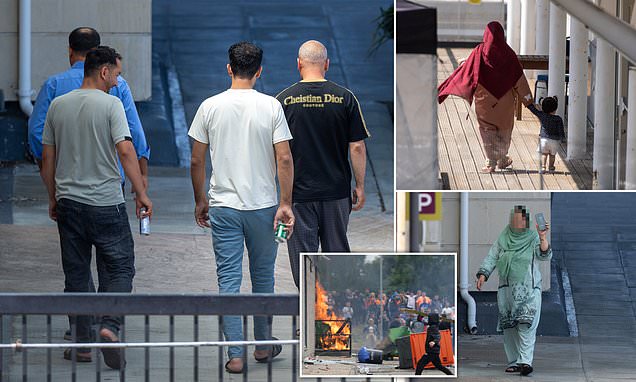For over a year, questions lingered in local communities across Britain about the sudden rise in Afghan migrants.
Now that a long-standing court-ordered media blackout has been lifted, the answers are finally coming to light — and they’re stirring up serious tension.
Thousands of Afghans Quietly Relocated Amid Government Silence
The British government had been quietly bringing thousands of Afghan nationals into the country under a secret resettlement operation that the public — and even many elected officials — knew nothing about.
This hush-hush initiative was protected under a superinjunction that blocked not only media reporting but also prevented Parliamentary debate.
The reason behind this quiet influx?
A critical blunder during the British military’s operations in Afghanistan reportedly left nearly 100,000 Afghan allies exposed to Taliban retaliation.
In response, ministers began quietly relocating thousands — around 18,500 so far — to the UK.
Many were housed in military bases and hotels without any public explanation.
Government Braced for Public Backlash and Summer Unrest
As soon as the gag order was lifted, senior officials warned of possible unrest, especially in areas that had already been on edge due to growing migrant numbers.
A confidential Ministry of Defence (MOD) document from July 4 noted that the summer period posed the highest risk for public disorder and advised other departments to prepare accordingly.
Last year’s violent riots following the Southport incident were primarily concentrated in places with high numbers of Afghan arrivals — a detail ministers knew but the public never did.
An internal briefing even admitted that 15 of the 20 most affected towns were among the top areas hosting resettled Afghans.
Public Kept in the Dark While Ministers Were Privately Warned
Despite ongoing Parliamentary inquiries into the causes of last year’s violent outbreaks, MPs were never told the full story due to the legal restrictions.
Yet behind closed doors, cabinet ministers were briefed on October 7 that the far-right attacks against asylum seekers and Muslim communities were the worst race-related violence seen in decades.
One key takeaway from a Commons Home Affairs Select Committee investigation was that a lack of transparency allowed rumors and misinformation to thrive — further damaging trust in public institutions and policing.
Frustration Grows in Towns Struggling with Sudden Influx
Across many British towns, the sudden appearance of Afghan families in hotels and military housing stirred confusion and resentment.
In Bracknell, for example, local councillors said residents had welcomed Afghan allies with open arms — especially those who had assisted British troops during the war.
But that goodwill has been tested by what some see as unfair disparities in treatment.
John Edwards, an independent town councillor, shared that while Afghan arrivals were placed in a four-star hotel with full support, a local veteran who also served in Afghanistan was living in a mould-infested flat with his wife and two daughters, both of whom had been hospitalised due to poor conditions.
“I want to help,” the veteran told him, “but where’s my help?”
Misinformation and Secrecy Breeding Resentment
Bracknell’s local council eventually issued a plea urging residents to ignore rumors and assured them that Afghan arrivals would not be given housing priority over veterans.
Still, the confusion — and the fact that even MPs weren’t told the full story — continues to erode public trust.
The Ministry of Defence has acknowledged it was using 20% of its housing stock at one point to shelter Afghan arrivals.
But that wasn’t enough.
Many have since been placed in hotels, at an estimated cost of £8 million per day to taxpayers, even as the government insists it’s trying to phase out hotel use for asylum seekers.
Complaints Silenced as Military Families Voice Safety Concerns
Tensions also flared on military estates like Larkhill in Wiltshire, where soldiers’ families raised alarms about Afghan refugees moving into service accommodation.
Some wives claimed they felt uncomfortable after Afghan men were seen taking photos of children.
Though there’s no evidence of bad intent, the incidents raised legitimate safeguarding questions — but instead of addressing concerns, the MOD reportedly threatened disciplinary action against those who spoke out.
Integration Challenges Ignored for Too Long
Private documents show government officials had long warned of the serious challenges posed by moving large groups into towns without properly preparing local services.
Schools, healthcare systems, and social support networks have been strained, yet communities received no prior warning or explanation.
The secrecy around the entire scheme — from the rationale behind it to the scale of relocation — left a vacuum that conspiracy theories and resentment quickly filled.
Now, as the public grapples with the truth, the focus has shifted to rebuilding trust, managing local services fairly, and ensuring community cohesion doesn’t break down further.
What Comes Next?
With the superinjunction finally lifted, the government now faces urgent questions.
Can they win back the trust of communities that felt ignored?
Will veterans and vulnerable citizens receive the same level of care as those brought here under emergency schemes?
And most importantly, how can the government prevent unrest from boiling over again?
What’s clear is that honesty and accountability are long overdue.
People deserve the truth — and they deserve a say in how their communities are shaped.
